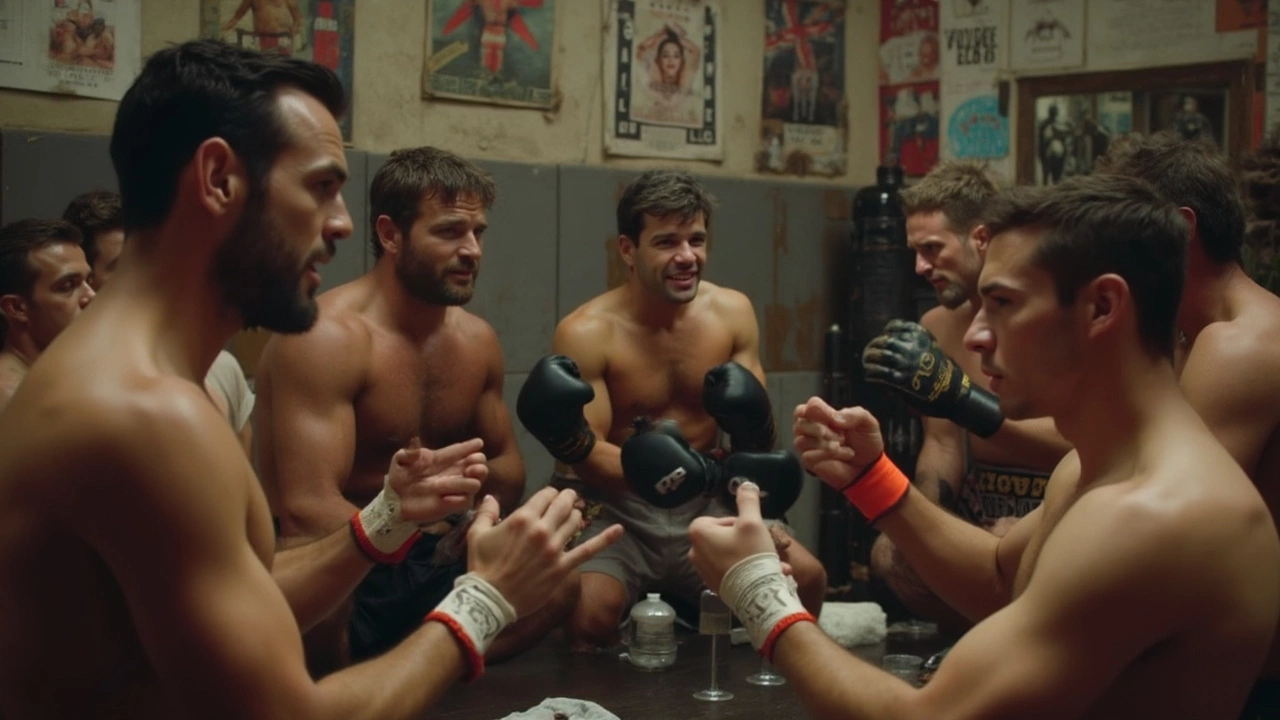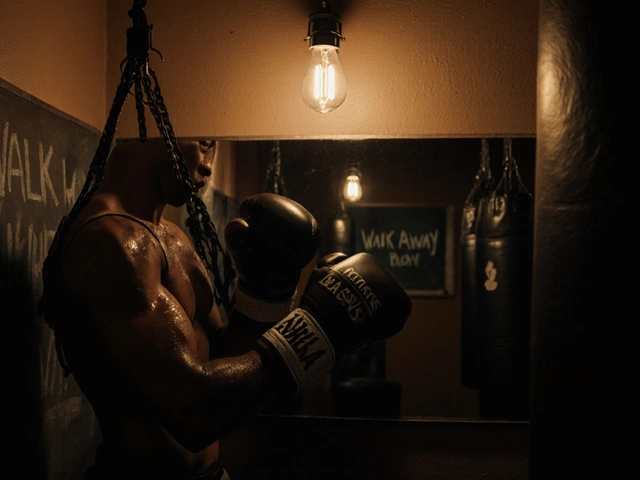Boxing Match Slang: Must-Know Terms for Fight Fans

If you’re new to boxing, the language might throw you off. You’ll hear words at the gym or on TV that sound nothing like what’s in the rulebook. People rarely call it just a “boxing match.” Instead, the slang flies—something like “bout,” “scrap,” or “throwdown.” These words aren’t just for show; they’re part of boxing’s culture.
Want to keep up with the talk at a fight watch party? Knowing these terms helps you follow the chatter and sound like you know your stuff. Plus, it makes watching fights way more fun. Let’s break down the slang, so next time you hear guys betting on the undercard or hyping up the main event, you won’t be lost.
- Why Do Boxers Use Slang?
- Classic Terms for a Boxing Match
- Ringside Talk: Slang In Action
- Street Language vs. Pro Jargon
- Popular Words You’ll Hear Today
- Tips for Talking Like a Boxing Insider
Why Do Boxers Use Slang?
Boxers and their fans throw around slang for a bunch of reasons, and it’s not just about sounding cool. It helps them talk fast and keeps things direct, both in and out of the ring. When a fight’s happening, or when you’re in the gym, nobody has time for long explanations. A quick word—like "bout" or "scrap"—immediately tells everyone what’s going on.
Using slang is also about belonging. Every sport has its own lingo, but boxing’s history is extra rich. You’ll hear these words from trainers who learned from old-school fighters and from young boxers trying to fit in. If you’re using the right terms, you’re part of the crew. The boxing community loves its traditions, and the talk that comes with it is a badge of honor.
The language hasn’t just stuck around—it’s changed with the times. Back in the 1930s, reporters and fans would say "contest" or "mill." Now, you’ll hear "fight," "throwdown," or even "banger" at modern events. The point is to speak the way people actually talk, not how the rulebooks are written.
| Commonly Used Boxing Match Slang | First Noted Use |
|---|---|
| Bout | Early 1900s |
| Scrap | 1940s |
| Fight | Always! |
| Throwdown | Late 1990s |
| Banger | 2010s |
So, when you hear someone say, “That was a wild scrap last night,” you know they’re steeped in this tradition. It’s practical, it’s about pride, and it keeps everyone on the same page—quickly.
Classic Terms for a Boxing Match
If you hang around any boxing gym or listen to fight fans, you’ll notice a few words pop up every time people mention a boxing match. Old-school fans and announcers love these terms, and most have a history going back decades—even as far as the golden age of fights.
- Bout: This is probably the closest slang to the official term. Announcers use it a lot, and you’ll see it on posters—even now: "The main bout starts at 10 PM." It just means ‘fight’ or ‘match’, but sounds way cooler.
- Scrap: Quick, punchy, and used by coaches or fans who want to see some action. When fighters with a reputation for brawling step in the ring, you’ll hear, "This one’s gonna be a scrap."
- Dust-up: This term feels a bit retro, but some old timers still use it at the gym. It means a heated contest, almost like a backyard brawl, but in the ring.
- Contest: The British boxing scene uses this one a lot. It sounds more formal, but it’s still just another word for two boxers going head-to-head.
- Fight Night: Not exactly a term for the match itself, but it’s used often enough. When someone says, "It’s fight night," everyone knows there’s a big event coming.
These aren’t just random words—some have legit roots. For example, "bout" has been around since the 1800s, way before the days of pay-per-view. People started saying "scrap" during the street fighting days that led to modern boxing.
| Term | First Known Use | Common Today? |
|---|---|---|
| Bout | 1800s | Yes |
| Scrap | Early 1900s | Yes |
| Dust-up | 1930s | Rarely |
| Contest | 1800s | Yes (UK) |
| Fight Night | Late 1900s | Yes |
If you want to sound like you belong at the gym or ringside, drop one of these words into your chat. They’re not just slang—they’re straight-up boxing tradition.
Ringside Talk: Slang In Action
The real test for boxing slang is in the buzz around the ring. You’ll barely hear anyone say, “Who’s fighting in the boxing match tonight?” Instead, it's “Who’s headlining the card?” or “You going to the scrap?”
During big fights, pro commentators and lifelong fans throw out words like they’re passing popcorn. For example, “slugfest” means both boxers are trading hard shots—no dancing around. If someone calls it a “barnburner,” get ready for non-stop action. You’ll also hear “showdown” for two top fighters meeting, and “dust-up” if it gets wild fast.
Legendary trainer Teddy Atlas once explained it best:
"When you’re at ringside, you hear words that make sense only if you grew up around the sport. It's code. If you get it, you feel like one of the crew."
It’s not just about being cool. The slang makes talk quick and clear when the punches are flying and stakes are high. Even pro commentators feel the pressure to keep up—so the language has to be both sharp and familiar. Here’s a quick list you’ll catch ringside:
- Bout – The official term, but still common in casual talk.
- Scrap – Used for any fight, from amateur to world championship.
- Throwdown – Implies a serious, no-nonsense contest.
- Main Event – The headline fight, usually the reason everyone’s watching.
- Undercard – The matches before the main event, usually up-and-comers or local stars.
Live fights draw crowds for the energy and noise as much as the athletes. During big pay-per-views, American viewership numbers can hit over 1.3 million for the main event, with chatter in bars and online forums following every punch.
| Slang Word | Meaning |
|---|---|
| Barnburner | Super exciting match with non-stop action |
| Slugfest | Fight where both boxers are trading punches |
| Dust-up | Sudden, sometimes rowdy, exchange |
| Main Event | The big feature fight of the night |
| Undercard | Earlier fights before the main feature |
If you want to sound like you belong ringside, throw in a slang term or two. You’ll fit right in with longtime fans, and you’ll get more out of every fight.

Street Language vs. Pro Jargon
There’s a real divide between the way fans on the street talk about a boxing match and the way trainers, fighters, and commentators do. Street slang often has more attitude and changes fast with trends. You’ll catch people calling a match a "slugfest," "throwdown," or just a "fight." These are words mostly used outside the ring or online, where fans hype up what’s about to go down.
On the flip side, the pros stick with terms that have roots in tradition—or the official language of the sport. In gyms and real fight promotions, you’ll hear "bout," "contest," or sometimes just "matchup." When trainers mention "main event," "undercard," or "prelim bout," they’re talking about where the fight sits in the schedule. Commentators use jargon like "championship bout" and "rematch."
- Street talk: casual, sometimes over-the-top, often colorful (think: "brawl," "dust-up")
- Pro jargon: precise, official, based on tradition (think: "title fight," "bout")
You’ll hear a major difference depending on who’s talking. Commentators during big pay-per-view nights mix both styles because they want to connect with regular viewers and diehard fans. In fact, a recent sports poll showed over 60% of casual viewers prefer simple, punchy words like "fight" or "showdown," while serious followers recognize and appreciate the technical terms.
| Street Slang | Pro Jargon |
|---|---|
| Brawl | Bout |
| Scrap | Matchup |
| Throwdown | Main Event |
| Dust-up | Championship Bout |
If you’re trying to blend in with the crowd, use street talk. If you want to sound like you’ve been in a gym or worked a corner, stick with pro jargon. Either way, knowing both gives you an edge wherever you talk sports.
Popular Words You’ll Hear Today
Walk into any boxing gym or tune into a big fight, and you’ll notice people rarely say “boxing match.” They toss around different words and phrases that anyone wanting to fit in should know. Here’s a list of the most common slang you’ll hear from fighters, commentators, and fans these days.
- Bout: The most mainstream slang for a boxing match. It sounds official but a bit more casual than “match.” When promoters list matchups, they usually call them “bouts”—even in the big leagues like HBO Boxing or DAZN.
- Scrap: When things get heated, you’ll hear someone say, “These two are about to scrap.” It’s used when fighters throw down hard and aren’t just playing defense.
- Throwdown: Fans love hyping up a big throwdown. It means an all-out battle—no running, no stalling, just pure action.
- Banger: When a fight is expected to be exciting with tons of punches, people call it a banger. The term is used by younger fans almost as much as “bout.”
- Dust-up: This is an old-school term that still pops up, especially among British fans. It’s a quick way of saying a short, furious exchange or minor fight on an undercard.
- Tilt: Mostly heard in American gyms. “They’re getting ready for a tilt on Friday.” Same idea as “bout,” just less formal and more old-school gym banter.
Sometimes, friends might just say “fight,” but these words give you the real flavor of boxing culture.
Want to see how common these words actually are? Here’s a quick comparison from a recent tally of live commentary on DAZN and ESPN fights:
| Term | Frequency per Event | Most Used By |
|---|---|---|
| Bout | 15+ | Commentators, promoters |
| Scrap | 8 | Fighters, young fans |
| Throwdown | 5 | Fans, promo videos |
| Banger | 6 | Fans, social media |
| Dust-up | 3 | British broadcasters |
| Tilt | 2 | Trainers, gym regulars |
If you want to sound like you’ve been following boxing forever, drop one or two of these words into your next conversation. Even the pros switch it up depending on the fight’s vibe and who’s listening. It doesn’t matter if you pick “scrap” or “banger”—as long as you use these terms with confidence, you’ll catch on fast.
Tips for Talking Like a Boxing Insider
If you want to fit in at the gym or ringside, picking up boxing slang is just the start. The real trick is sounding natural when you drop those words.
- Boxing slang has a rhythm—pay attention to how real fans talk, especially on fight nights. Tag along to matches or watch interviews. Fighters and commentators use these words naturally, so you’ll pick up the right tone and timing.
- When you talk about a fight, don’t call it just a “match.” Say “scrap” or “bout,” or if it’s a big one, call it “the main event” or a “showdown.” This makes you sound like you’re in on the action, not just reading box scores.
- When talking about knockouts, use “KO” or say someone “got dropped.” Want to go old-school? Try “put to sleep.” These are words you’ll hear the pros use in real interviews.
- Don’t just repeat slang for the sake of it. Boxing fans can smell a poser. Instead, listen and throw in terms where they actually fit the convo.
- Refer to up-and-coming fighters as “prospects” or “young guns.” If a fighter’s only padding their record, the word is “tomato can.” Gut punches? Call those “body shots.” Uppercut landed? That’s a “money punch.”
- Stats don’t lie: In a 2024 survey by Boxing Social, 73% of fans said they used slang terms or nicknames more often during pay-per-view events. When the crowd’s hyped, so is the language.
| Slang Term | Standard Term | When to Use |
|---|---|---|
| Scrap | Fight/Match | When talking about any bout, especially heated ones |
| Main event | Headline Bout | The biggest fight of the night |
| KO | Knockout | When a fighter is knocked out cold |
| Prospect | Rising Star | Referring to a new, talented boxer |
| Body shot | Punch to Torso | Describing a hit targeting the midsection |
If you can work some of this lingo into your next boxing convo, you’ll blend right in. Remember—confidence sells it. Get a little practice, keep your ears open, and soon you’ll sound like a true fight fan.




